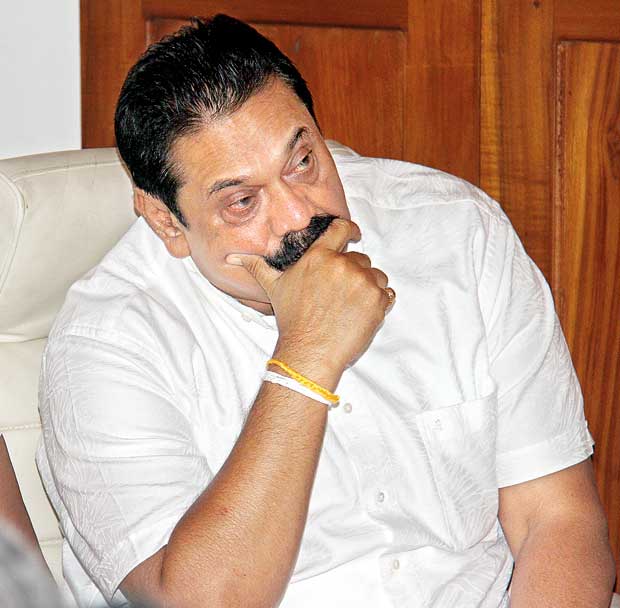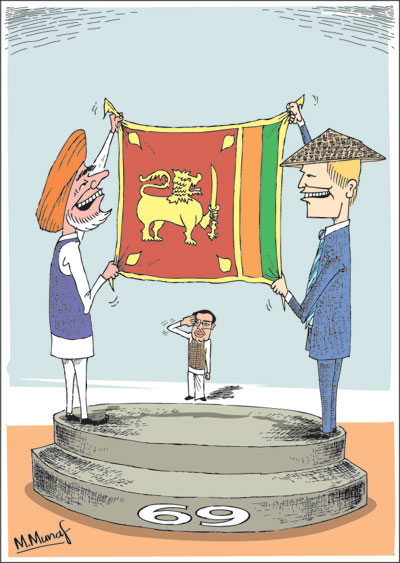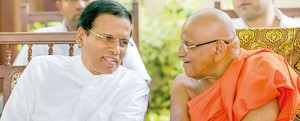Despite the existence of a UNP-SLFP alliance at the present time a
question mark hangs over the future of the alliance in 2020 when the
next presidential and general elections fall due. The indications are
that the UNP and SLFP are both planning to revert once again to their
traditional roles as political foes to each other, with each seeking to
defeat the other at any cost and monopolize the fruits of power. Past
practices that these parties have used against each other include
denying their opponents their civic rights afte legal and political
procedures of doubtful integrity, and the fanning of ethnic nationalism
to steal a march over the other.
The six chief ministers of provincial councils governed by the SLFP who
met with former president Mahinda Rajapaksa, himself a former SLFP
president, expressed the strong desire of the rank and file in the party
for a rapprochement between both factions of the SLFP, one led by
President Sirisena and the other by the former president. The hope of
the SLFP party membership is that a reunification of the SLFP will
enable them to defeat the UNP and other political parties at future
elections. The concern of both factions of the SLFP is that if they go
into the local government election process without unifying themselves
they will be handing over victory to the UNP.
PROLONGED DELAY
The prolonged delay in holding the local government elections which are
now two years overdue is most likely to be connected to the divisions
within the SLFP which will disadvantage them and hand over the advantage
to the UNP. The reason given by the government for the postponement of
elections is that the Delimitation Review Committee, which delayed its
own report had now handed over an incomplete report with many errors in
it. After the report on their findings has been completed and handed
over to the government, the government itself is complaining that the
report is flawed and needs to be further revised. The perception that
the government is seeking to avoid holding elections any time soon, is
further undermining it.
Apart from undermining the government’s image as a democratic entity
that is backed by the people, the rift between the UNP and SLFP is also
leading to a lack of coherence in policy making. The government appears
unable to progress on the three important economic initiatives it has
undertaken. The Chinese investment in Hambantota Port and the industrial
zone in the adjacent area are at a standstill. The Economic and
Technology Cooperation Agreement (ETCA) with India continues to be in a
prolonged process of negotiation. The GSP Plus tariff concession by the
European Union requires Sri Lanka to accede to international human
rights standards and to international covenants it has signed. On each
of these three economic issues President Sirisena has either been
blocking or slowing down what the UNP has been proposing.
The issues on which President Sirisena has stepped in to intervene have
their downsides. He has strongly opposed corruption in the government
and refused to sign on to projects which appear to reek of it. The
Chinese are seeking a 99 year lease which has implications for the
country’s sovereignty as China is not just any other country, but an
expanding world power that is a rival to India which is Sri Lanka’s
closest neighbor. The controversy over ETCA with India reflects the
larger concerns in Sri Lankan society about being swamped in an open
economic relationship with India. On the other hand, there are also
issues on which the President has intervened where his positive
contribution is much less clear. An example would be the draft National
Human Rights Action Plan (NHRAP) on which he has made strong comments
and registered his opposition.
The President has come out publicly in favour of the government’s
decision not to proceed with legal reform with regard to decriminalizing
homosexuality. The presence of archaic laws does not reflect positively
on either the Sri Lankan legislature or on the cultural enlightenment
and tolerance of the population at large. In addition the President has
not yet gazetted the Office of Missing Persons Act which was passed by
Parliament in August last year. This was one of the transitional justice
mechanisms promised by the government to the UN Human Rights Council in
October 2015. This has eroded the government’s credibility especially
amongst the Tamil people who suffered the largest amount of enforced
disappearances and also the international community who expect the
government to adhere to international standards.
PRESIDENT’S PROBLEM
The problem for the President is that he is unwilling to take policy
decisions on controversial issues that would alienate the SLFP faction
that is headed by former president Mahinda Rajapaksa. Former president
Rajapaksa’s speech at the Joint Opposition rally last week gives an
indication of the thinking that prevails amongst this faction of the
SLFP. He said there were plans to replace the present Constitution with a
separatist one prepared according to the needs of LTTE sympathizers
abroad and the so-called international community. He also said the
present government was boasting that they had regained the GSP+ tax
concession, but the EU would only grant the facility after they
fulfilled its conditions, including legalizing homosexuality.
The best way for President Sirisena to break out of this type of
backward thinking is to dispense with his need to obtain their support.
At the present members of the president’s team complain that they are
left out of key government decisionmaking perhaps due to the fear that
they will oppose them for narrow political reasons. This suggests that
the UNP and President Sirisena’s faction of the SLFP should cease to be
political rivals. The agreement at the presidential election of 2015 was
that the presidential candidate would contest under a common electoral
symbol where the UNP and those in the SLFP who supported the president
joined together. The agreement that followed the victory at the
presidential election and general election of August 2015 was that the
UNP and SLFP would cohabit for a minimum of two years which was later
extended to five years.
Putting an end to the debilitating rift between the UNP and SLFP faction
headed by President Sirisena requires that the agreement to form a
government of national unity should be extended to beyond 2020. This
suggests that the same agreement that prevailed at the presidential
election of 2015 should be entered into when the 2020 elections fall
due. If this agreement is reached, President Sirisena will become
empowered to stop attempting the impossible task of obtaining the
support of the SLFP faction led by former president Rajapaksa. Instead
he can, and must, work as a full and equal partner with the UNP headed
by Prime Minister Ranil Wickremesinghe. The UNP also needs to include
the President and his team in joint decisionmaking. They need to work
together, consult and decide together, in a manner where the two become
one. This is the way out of divided and contradictory governance which
is yielding too little fruit for the people who are impatient for
fundamental and genuine change that will transform the country.
A Brief Colonial History Of Ceylon(SriLanka)
Sri Lanka: One Island Two Nations
A Brief Colonial History Of Ceylon(SriLanka)
Sri Lanka: One Island Two Nations
(Full Story)
Search This Blog
Back to 500BC.
==========================
Thiranjala Weerasinghe sj.- One Island Two Nations
?????????????????????????????????????????????????Tuesday, January 31, 2017
Vaddakkandal massacre remembered on 32nd anniversary
30 Jan 2017
The 32nd anniversary of the Vaddakkandal massacre was marked today at the Vaddakkandal Government Tamil Mixed School in Mannar.
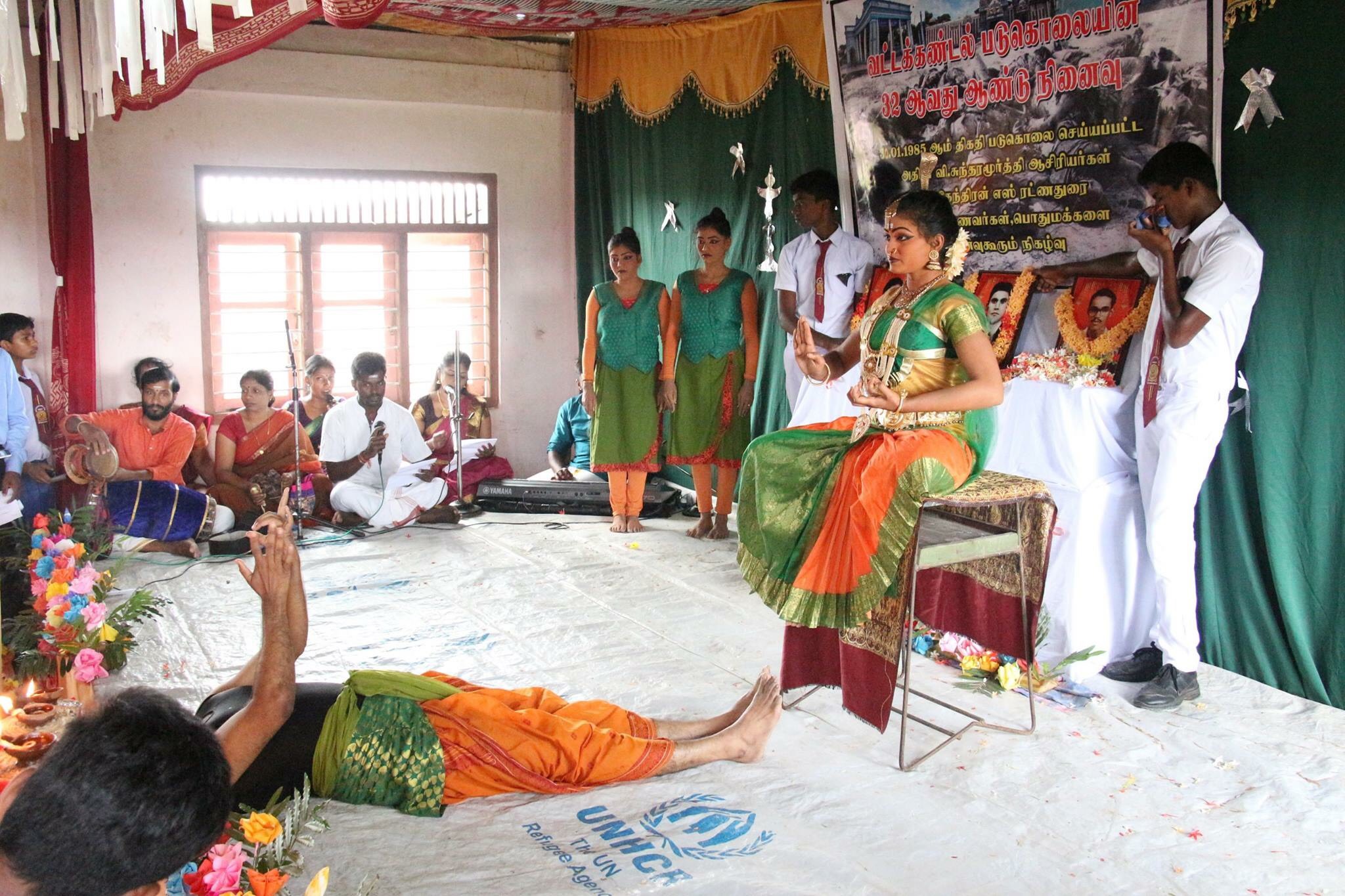 |
At dawn on 30 January 1985, 200 Sri Lankan military personnel based in
the Thallady camp moved into the Vaddakkandal village, killing at least
52 civilians.
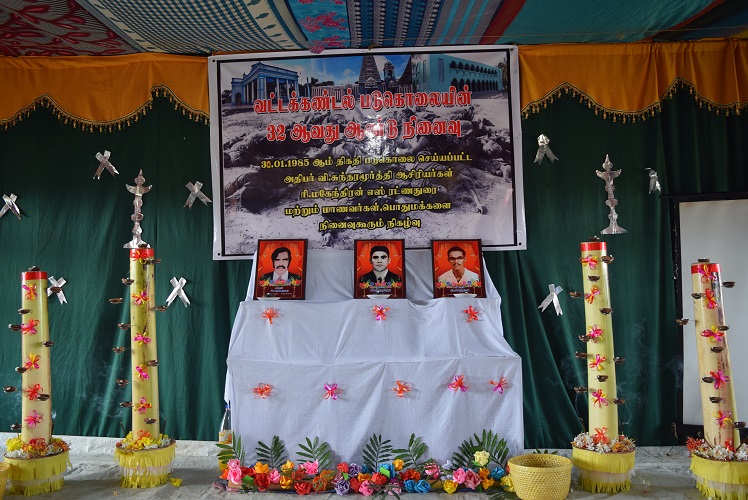 |
Soldiers also entered the Vaddakkandal GTM school, killing at least 18
people, including the principal, other teachers and members of staff and
students.
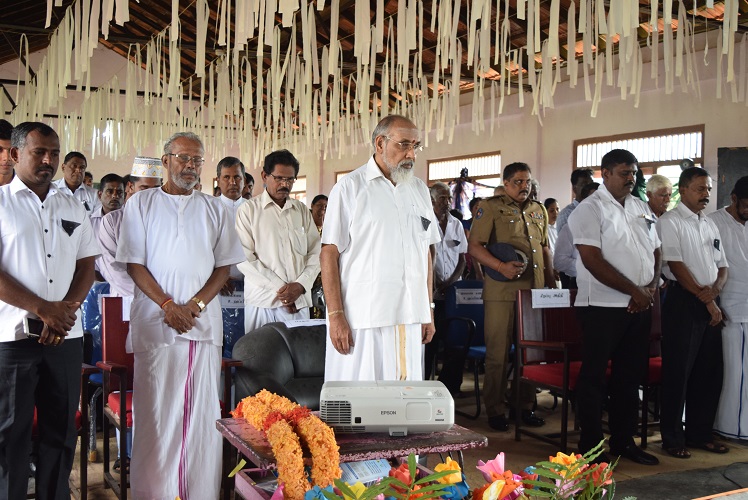 |
The event featured guests including politicians and religious leaders
from all religious communities, as well as relatives of those killed in
the massacre.
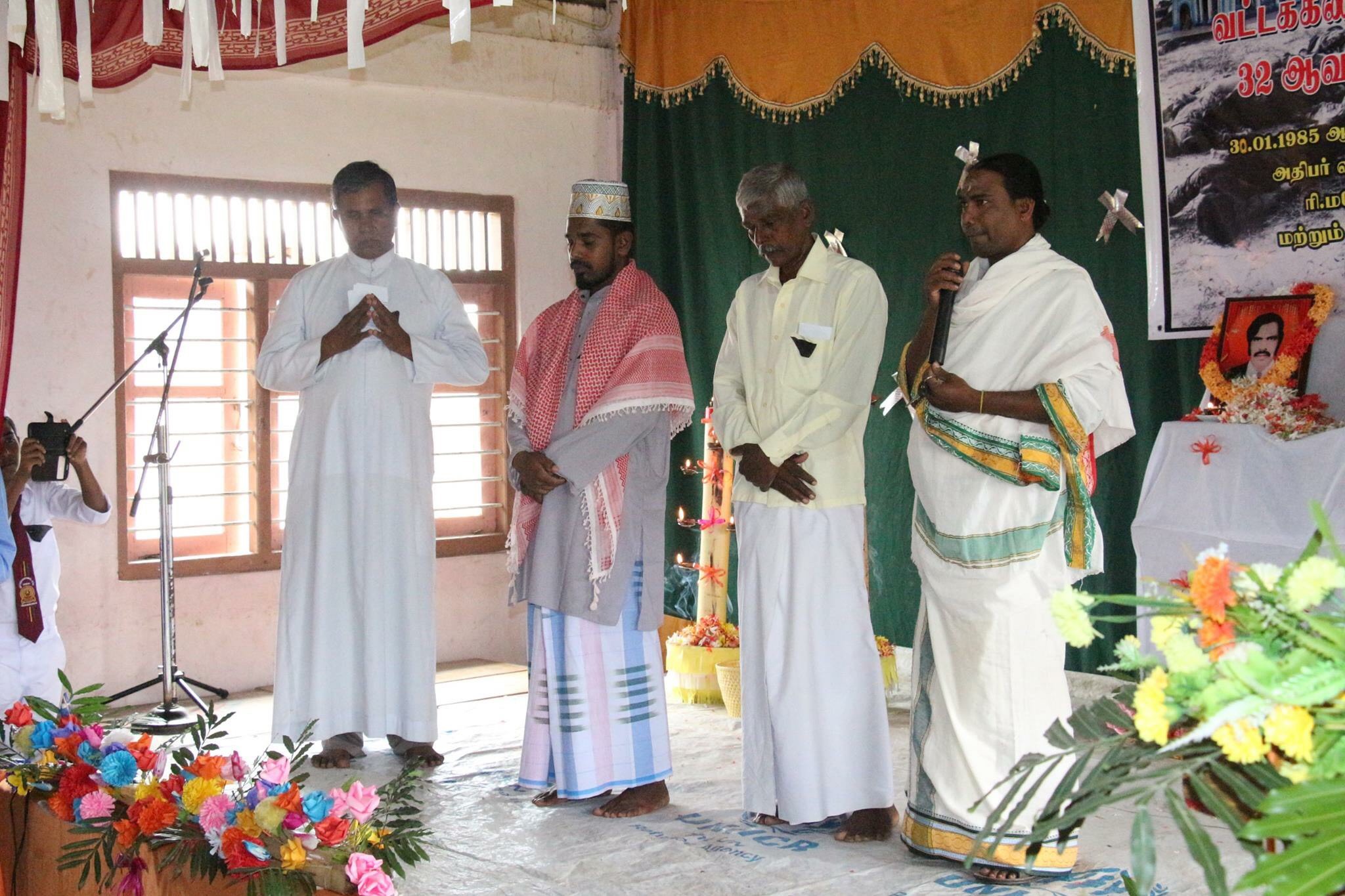 |
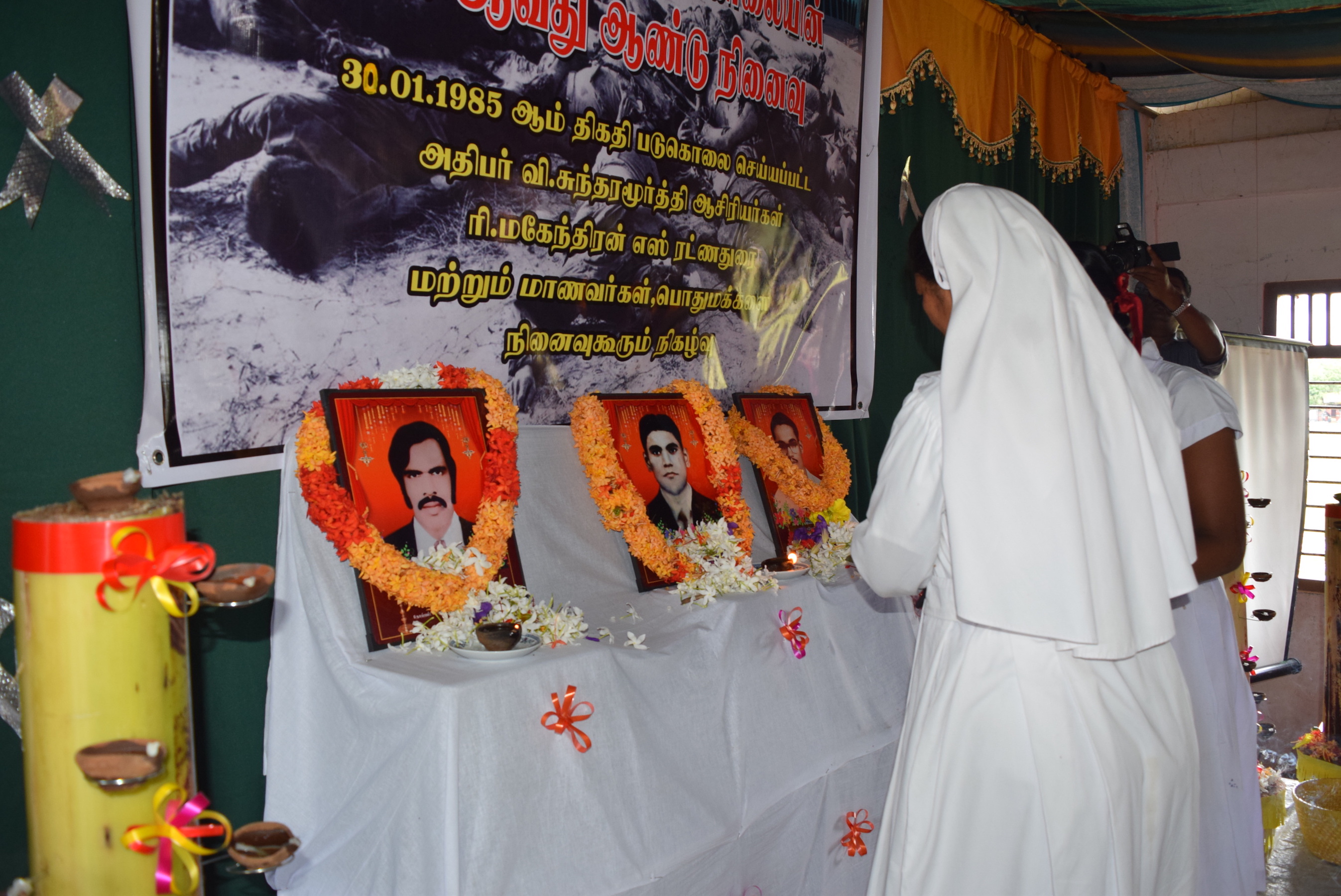 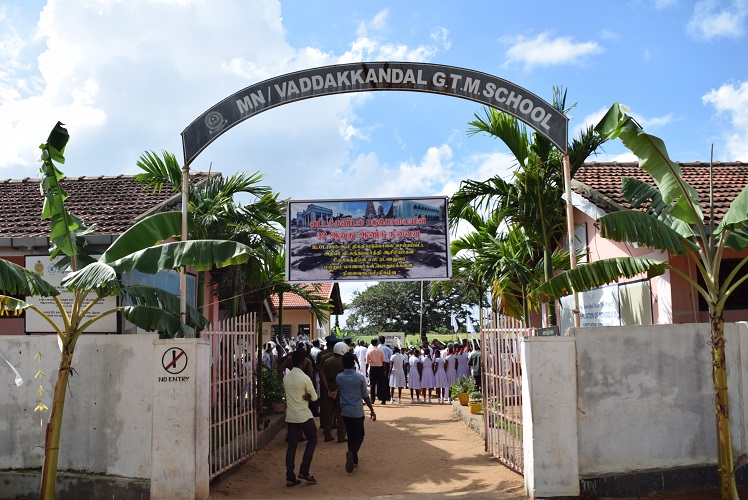 |
Sri Lanka: “Thirteenth (13th) Amendment no solution to our problem”

( January 30, 2017, London, Sri Lanka Guardian) JVP MP
Vijitha Herath visiting London on invitation for a Workshop of
Westminster Foundation for Democracy, also met the Tamil and Muslim
diaspora on 27 January 2017 at Trinity Community Hall, East Ham, London
E12 6SG. He stated that the 13th Amendment was no solution to the problem in Sri Lanka.
Both the Tamils and the Sinhala people should have equal economic
rights. Both Languages are state languages, but there is no
implementation of the Tamil language in many areas and as seen
particularly in Police stations. As far as national unity is concerned,
the JVP has always stood for united and not a divided country.
Our political stance all long has been to strengthen against separatism.
We demand full devolution of power to all people, of whatever ethnicity
or religion whether they are Sinhala, Tamil or Muslim.
By comparison he mentioned in the UK there were people of all national
diversities, many backgrounds, but had equal rights before the law and
lived together. Similarly, in Sri Lanka, we in the JVP categorically
said in 1987 there was no need for giving any group of people separate
status, that our experience after 38 years has shown that the 13th amendment was no solution. That is the reality.
The basis of power in society is the economic power of the people and to
achieve this objective we had to build national unity. The JVP has all
along fought for the economic rights of all people of Sri Lanka. We want
to give equal rights to all our people. It is important how to
practically achieve it.
“We promoted our solution one month after the end of the war in 2009 to
create the basic steps to reduce difference. It was to build up the
North and the East of Sri Lanka. It was to change working practices. It
was to give equal status to Sinhala and Tamil language as State
Languages as well as to the medium of communication in the English
language. The current government did not do that. There is small
change”.
“We suggested other rights for the State Plantation workers’ rights.
Children belonged and were classed as Indian Tamils. We wanted it
changed to Tamil not classed as Indian Tamil as a first step. The CWC
leaders were opposed to this for their own reasons”.
“We maintained that there should be established civil administration in
the North and East provinces. As is seen, there is some change”.
“Our starting proposal was if we can take thorough steps in our society,
there was no need to change the Constitution. We maintained that the
new government must fulfil the main economic and social action of our
society, take basic steps immediately, then the people won’t demand
separate areas for Tamils and Muslims”.
He went on to state: “A separate State for any group of people, it can never happen.
We need to give equal rights on basis of economics and if we go beyond that there will be a problem.”
“We propose the giving of practical self government, give economic and
political rights to the individual in the first instance. We’ve had so
many talks about a change of systems. It is not the fault of the JVP in
principle or programme. It is the fault of the present and past
governments.”
During a question and answer session, Parliamentarian Vijitha Herath
said that the JVP was not a nationalist party; we are opposed to
separatism of any kind. We are opposed to separatist movements. During
the 1998 insurrection we never took up arms against any Tamil or Muslim.
In answer to a further comment, he maintained that the JVP was never a
racist party We are for individual rights and not for community rights
per se. Community power must however, be protected, but we speak for all
the people of Sri Lanka.
Comment
Members of Parliament of Sri Lanka are often invited to attend
conferences in London, but of the eight recent visitors from various
parties attending the Workshop at Westminster during 23 -27 January
2017, it appears the JVP representative was willing to brave the wintry
weather to meet with the Tamils and Muslim diaspora, along with the
Sinhala group. There perhaps could be an easing if not an amelioration
in the stand taken by both camps, with regard to the national question,
in view of the current situation in Sri Lanka.
SRI LANKA: REPORT OF THE CONSULTATION TASK FORCE ON RECONCILIATION MECHANISMS IS TREACHEROUS – NWH
Image: Mrs. Manouri Muttetuwegama presented the report of the
“Consultation Task Force on Reconciliation Mechanisms” to chair of the
SCRM Chandrika Kumarathunga.
Issuing a statement the National War Heroes Front says that report of
the “Consultation Task Force on Reconciliation Mechanisms” (CTFRM) set
up on 26.1.1916, & chaired by Mrs. Manouri Muttetuwegama is a most
treacherous document. This is seen clearly and immediately by the fact
that the report was fully endorsed and welcomed by both the TNA and the
GTF. TNA is the political arm of the LTTE and GTF is an NGO once banned
under the UN Charter for directly supporting the LTTE. The LTTE is, even
as yet, categorized as the most ruthless terrorist organization in the
world and it is still in the banned list of 32 countries worldwide.” The
statement is singed the statement issued by the President of the
National War Heroes Front Rear Admiral (Retired) Sarath Weerasekera.
Excerpts from the statement follows:
It is a lowly and a contemptuous attempt, by CTFRM together with TNA and
GTF, to seek punishment and bring discredit to the war heroes who
survived. How much money has been paid officially /unofficially to the
eleven members of the CTFRM by the separatist Tamil Diaspora is not
known, for, no one with an iota of patriotism would present a report
based purely on the evidence of people instigated by the separatist TNA.
The head of the UNHRC, Zeid Hussein, has also welcomed the
recommendations of the CTFRM. … So a report which could bring a grin on
to the face of Zeid Hussein would also be one of such nature, and hence
should be rejected in toto.
The Report also says that people have no faith in the national judiciary
and recommends a hybrid court on the basis of competence/impartiality.
If our judges are competent enough to sentence people to death and if it
goes unquestioned to date, they should be equally capable of taking
decisions on accountability as well. Also if foreign judges are
recommended on the basis of competency, in a hybrid court, the entire
accountability process would be solely handled by the foreign judges
themselves and our judges would be just sitting for namesake. …. If not
the Manouri Muttetuwagama panel should be held for contempt of court for
ridiculing and insulting our judiciary in the eyes of the world
community.
The CTFRM has finally recommended measures to build confidence among the
Tamils in North in order to meet their aspirations. The Northern Tamils
comprise only 48% of the country’s Tamil population but there is no
reference to the Tamils (52%) living amongst the Sinhalese in the South.
Does that mean that the CTFRM is not concerned about the aspirations of
the Tamils in the South or do they believe that their aspirations have
already been met?
Anyone who betrays the country should be charged for treason. It is up
to the Court to interpret and define treason. The important point to
remember is that treason is an offense punishable by death. Unlike those
who do not have any faith in the local judiciary we are fully confident
that our judges are fully capable of defining Treason and punish
accordingly.”
Protection Of Minority Rights Must Include Sexual Minorities: NPC Tells Government

January 31, 2017
According to the UN Human Rights Council, the legal obligations of
States to safeguard the human rights of Lesbian, Gay, Bisexual and
Transgender (LGBT) people are well established in international human
rights law on the basis of the Universal Declaration of Human Rights and
subsequently agreed international human rights treaties ratified by Sri
Lanka, says the National Peace Council.
 Issuing
a statement today the NPC has called on the government to take steps to
repeal those sections of the Penal Code and Vagrants Ordinance that can
be used by those vested with state authority to harass people of a
different sexual orientation and who are thereby denied their rights to
equality and non-discrimination.
Issuing
a statement today the NPC has called on the government to take steps to
repeal those sections of the Penal Code and Vagrants Ordinance that can
be used by those vested with state authority to harass people of a
different sexual orientation and who are thereby denied their rights to
equality and non-discrimination.
We publish below the statement in full:
Protection Of Minority Rights Must Include Sexual Minorities
As an organization that believes in equality for all and
non-discrimination, the National Peace Council views the recent decision
of the government not to proceed with legal reform that decriminalizes
homosexuality as both disappointing and a setback to a culture of
protecting minority rights in general. The presence of archaic laws does
not reflect positively on either the Sri Lankan legislature or on the
cultural enlightenment and tolerance of the population at large.
We reject the notion that same sex relations are criminal in nature or
should be construed as such. Same sex relations are not due to modern
decadence, or Western decadence as argued by some, but have been part
and parcel of history from its very beginnings in all parts of the
world, including Asia. There is a need for education campaigns to ensure
that the thinking of society at large becomes more rational and less
emotional on these issues.
According to the UN Human Rights Council, the legal obligations of
States to safeguard the human rights of Lesbian, Gay, Bisexual and
Transgender (LGBT)
people are well established in international human rights law on the
basis of the Universal Declaration of Human Rights and subsequently
agreed international human rights treaties ratified by Sri Lanka.
We note that same sex relations are rarely if ever prosecuted in the Sri
Lankan courts. However, a recent report on Lesbian, Gay, Bisexual and
Transgender issues by Human Rights Watch details examples of
discrimination and abuse experienced by those of a different sexual
orientation.
Posted by
Thavam
UNP-SLFP UNITY BEYOND 2020 IS KEY TO NEW SRI LANKA--Jehan Perera
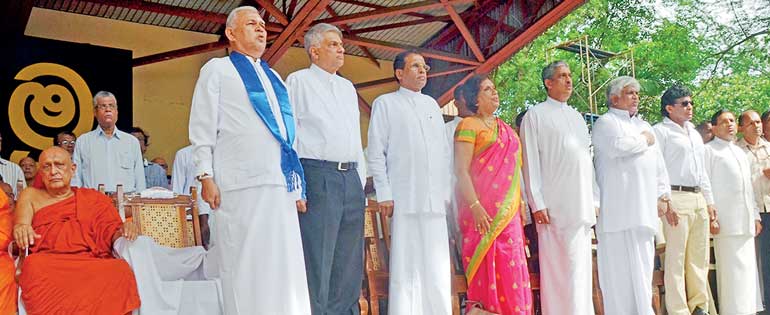
 by Dr Jehan Perera-Monday, 30 January 2017
by Dr Jehan Perera-Monday, 30 January 2017 The
formation of the Government of National Unity in the aftermath of the
victory of President Maithripala Sirisena at the presidential election
of January 2015 generated hopes of a rejuvenation of the polity and the
unleashing of its full post-war economic potential. However, much to the
disappointment of those who believed in the new government, the rift
between the UNP and SLFP, which are the two main constituent parties of
the government, appears to be increasing with the passage of time. At
its root is the perennial quest of politicians and political parties for
power, to gain it, keep it and not to lose it.
The
formation of the Government of National Unity in the aftermath of the
victory of President Maithripala Sirisena at the presidential election
of January 2015 generated hopes of a rejuvenation of the polity and the
unleashing of its full post-war economic potential. However, much to the
disappointment of those who believed in the new government, the rift
between the UNP and SLFP, which are the two main constituent parties of
the government, appears to be increasing with the passage of time. At
its root is the perennial quest of politicians and political parties for
power, to gain it, keep it and not to lose it.An open letter to SLFP General Secretary Duminda Dissanayke: Consultation on constitutional reforms

Jan 30, 2017
Hon. Duminda Dissanayake
General Secretary
Sri Lanka Freedom Party (SLFP)
General Secretary
Sri Lanka Freedom Party (SLFP)
Dear Duminda,
I thought I must write to you openly when I learned through the mass media, that some SLFP seniors in government were unsupportive of serious constitutional reforms and accordingly had persuaded President Sirisena, as SLFP leader to direct that the SLFP engages in some dialogue and consultations on the proposed reforms. You may consider my views as part of this consultation and on my part, they are complimentary to my personal submissions to the LLRC during its public hearings and draws from my experience as the former Director General of Relief, Rehabilitation and Reconciliation under President Kumaratunga and more recently as Chairman of the Resettlement Authority.
I thought I must write to you openly when I learned through the mass media, that some SLFP seniors in government were unsupportive of serious constitutional reforms and accordingly had persuaded President Sirisena, as SLFP leader to direct that the SLFP engages in some dialogue and consultations on the proposed reforms. You may consider my views as part of this consultation and on my part, they are complimentary to my personal submissions to the LLRC during its public hearings and draws from my experience as the former Director General of Relief, Rehabilitation and Reconciliation under President Kumaratunga and more recently as Chairman of the Resettlement Authority.
Consider the mandate of January 2015
I believe the context for the current process of constitutional reforms is the mandate received by President Sirisena in January 2015, which is clearly a mandate for reform. Those of the SLFP who were not part of securing that mandate, but now within Government, who were corrected by the sovereign voting public of our country, should be extra careful when opposing that mandate and defining the mandate is certainly not the purview of the defeated candidate former President Rajapaksa.
I believe the context for the current process of constitutional reforms is the mandate received by President Sirisena in January 2015, which is clearly a mandate for reform. Those of the SLFP who were not part of securing that mandate, but now within Government, who were corrected by the sovereign voting public of our country, should be extra careful when opposing that mandate and defining the mandate is certainly not the purview of the defeated candidate former President Rajapaksa.
Public consultations of the constitutions have already occurred
You are no doubt aware that public consultations on the proposed constitutional reforms occurred throughout our country and there was opportunity for all stakeholders to make their submissions through this consultation process. It would be useful for the SLFP to not reinvent the wheel as it were but to study, incorporate and draw from the public consultations already held.
You are no doubt aware that public consultations on the proposed constitutional reforms occurred throughout our country and there was opportunity for all stakeholders to make their submissions through this consultation process. It would be useful for the SLFP to not reinvent the wheel as it were but to study, incorporate and draw from the public consultations already held.
A democratic deficit
A vast majority of the period since the introduction of the first republican constitution of 1972 and continuing through the period of the current constitution of 1978, Sri Lanka has been governed under Emergency Regulations which have superseded the Constitution and thereby compromised and damaged constitutional governance and the rule of law in our land. While this situation may have been understandable in the context of our decades long civil armed conflict it becomes untenable in a period thereafter. The democratic deficit which Sri Lanka suffers from needs to be rectified through constitutional reform and the abolition of the executive presidency, the implementation of electoral reforms, the strengthening of individual and human rights, are all part of the efforts to address this democratic deficit.
A vast majority of the period since the introduction of the first republican constitution of 1972 and continuing through the period of the current constitution of 1978, Sri Lanka has been governed under Emergency Regulations which have superseded the Constitution and thereby compromised and damaged constitutional governance and the rule of law in our land. While this situation may have been understandable in the context of our decades long civil armed conflict it becomes untenable in a period thereafter. The democratic deficit which Sri Lanka suffers from needs to be rectified through constitutional reform and the abolition of the executive presidency, the implementation of electoral reforms, the strengthening of individual and human rights, are all part of the efforts to address this democratic deficit.
Creating an inclusive state
It was former member of Parliament and LTTE suicide bomb victim late Dr. Neelan Tiruchelvam, who perhaps best explained the rationale for constitutional reforms nearly twenty-five years ago, when he stated that we should rectify “the anomaly of having imposed a mono ethnic state on a multi ethnic polity”.
It was former member of Parliament and LTTE suicide bomb victim late Dr. Neelan Tiruchelvam, who perhaps best explained the rationale for constitutional reforms nearly twenty-five years ago, when he stated that we should rectify “the anomaly of having imposed a mono ethnic state on a multi ethnic polity”.
It is patently clear to all but the willfully blind, that Sri Lanka is a
society polarized on ethnic lines, with state institutions and
structures of governance that are non-inclusive and intolerant. The
virulent demagogy surrounding the singing of the national anthem also in
Tamil at last year’s national day celebrations, demonstrates both the
mono ethno-lingual nature of state festivals in the past and how much we
need to reform to be inclusive and tolerant. If the SLFP position is
that the 13th Amendment should first be implemented fully, then there is
no impediment to the executive decisions of immediately gazetting those
provisions of the constitution not yet implemented.
Examine prior SLFP positions on devolution under President Kumaratunga and President Rajapaksa
The SLFP has had a rich tradition of seeking political solutions of
inclusivity, diversity and tolerance going back to the Bandaranaike –
Chelvanyagam pact more than half a century ago. More usefully and
practically, it is incumbent upon the SLFP to learn from and incorporate
the policies, politics and thinking of both the SLFP led PA and UPFA
governments of President Kumaratunga and President Rajapaksa. Especially
relevant in this regard are the various work, recommendations and
policies of President Rajapaksa under his initiatives of the All Part
Representative Committee (APRC) and its various working groups, all ably
headed and led in the past by the old left leaders of DEW Gunasekera
and Prof. Tissa Vitharane. If former President Rajapaksa is not standing
by prior SLFP government positions on devolution including those of his
own Administration, then such policy changes may well be construed as
opportunistic and parochially motivated for extraneous reasons of
temporary political self-interest by a person who promises to topple the
government during the calendar year and need not be taken seriously.
Seriously examine Rajapaksa administration mistakes and avoid a return to the past
I would respectfully submit that a key requirement for the SLFP, before
the next general elections due in mid-2020, is an open and honest
examination of what went so badly wrong, especially during the second
Rajapaksa term and seek not only remedial measures but also to chart a
new course for the future rather than advocate a return to the past. The
public perception and allegations of rampant corruption, mismanagement
of the economy especially in mounting public debt on grandiose and
ill-conceived projects, ruining our foreign relations with all our key
trading partners, violating and abusing human rights with impunity,
including press freedom, centralizing power in the executive presidency,
subverting the judiciary and institutionalizing nepotism all
contributed to ending the Rajapaksa presidency, sooner rather than
later.
Finally, I admired your courageous and principled stand in supporting
then Common Candidate Maithripala Sirisena during the Presidential
Election of 2015. Your political foresight and maturity is a tribute to
your late father and I can think of no younger leader better suited to
hold the responsible position of SLFP General Secretary.
As you are aware, I currently serve as Advisor to the Minister of
Foreign Affairs, but please consider these submissions as done in my
personal capacity.
I take this opportunity to wish you every success in your endeavours.
With best regards,
Harim Peiris
- Daily News-
‘Seven or eight war criminals in Sri Lankan army’ claims Fonseka
Former Sri Lanka Army commander Field Marshal Sarath Fonseka claimed
that there may be “seven or eight” individuals in the armed forces who
are responsible for war crimes, as he lashed out against Sri Lanka's
former president for a loss of "discipline" in the army.
Mr Fonseka, who is now Sri Lanka’s Regional Development Minister, said
that in Sri Lanka 200,000-strong army “there might have been seven or
eight” individuals responsible for human rights abuses that blighted the
final stage of the island’s armed conflict and called for them to be
punished.
“If not, I don't think it is reality,” he told reporters after a meeting
with Buddhist monks, adding that “any government institution would have
one or two thugs, rapists and other miscreant”.
He went on to compare Sri Lanka’s armed forces to that of other
countries, stating that perpetrators of war crimes could be found in
other armies across the world.
“But they should not be shielded from punishment if they are guilty of
any crime regardless of their status,” continued Mr Fonseka, who became
Sri Lanka’s first and only five-star general under the current
government. He has previously denied all reports that troops under his
command committed war crimes and reiterated his commitment to defending
the army.
Allegations of war crimes were only levelled against the Sri Lankan
military after former president Mahinda Rajapaksa and his brother
defence secretary Gotabhaya Rajapaksa “introduced politics into the
Army” claimed Mr Fonseka.
Blaming the Rajapaksa brothers for a loss of “discipline” amongst the army, Mr Fonseka lashed out at the pair, stating,
"There was no threat of electric chair against the former President, but
he instilled fear among the people by always talking about such a
threat. It was we who commanded and fought the war, it was we who would
have been sent to the electric chair, if actually there were such a
threat.”
“If the former President was taken to the electric chair, that would be a disgrace even to that chair," he concluded.
MR’s opportune return
The election of President Sirisena and the unity government were once treated as a revolution. Revolutions, through the ballot or street protests, could only take a country so far. Sri Lanka at present may hold some distressing similarities with Ukraine, where several years back, mass protests toppled the pro-Russian Kleptocracy of Viktor Yanukovych, and brought to power the pro-European opposition. Now it appears that the latter is pilfering the State’s coffers more efficiently than its predecessor did, in addition to provoking a ruinous war with its powerful neighbour Russia.
Corruption, both real and perceived, would erode the appeal of recent democratic gains and endanger the future constitutional reforms that are intended to address the national question. Some time back, TNA MP Sumanthiran prophesied that if any it would be corruption that would derail a new Constitution. His prediction is menacingly coming closer to become a reality. High-level corruption would swallow up all the goodwill of this government and create a vacuum that would be filled by opportunistic charlatans who offer very simple solutions to complex problems, and govern the country by sowing divisions. That is where Mr. Rajapaksa comes in.
Ex-President Mahinda Rajapaksa will no longer be hiding behind his
couriers of the joint opposition (JO). Last week, he emerged from the
shadows of Abeyaramaya to boldly announce at a rally in Nugegoda that
after coming to power, he would recover billions that have allegedly
been looted by the incumbent government. His rally at Nugegoda was said
to be a very expensive affair: going by the expenses incurred for the
number of buses used to transport protestors from distant places to
Colombo, their pocket money, ‘bath packets’ and generous flow of booze
to keep everyone fired up, his financers had to foot a hefty bill. It
was his second coming party, so it ought to be a grand one. It was not
so much about the numbers in attendance, but the maximum effect and
appearance. Otherwise, why would organisers pick a place that got
overcrowded even for a Vesak Bakthi Geetha show? This Nugegoda joint
overflows with just a couple of thousand people, causing maximum traffic
jam, chaos and inconvenience so that the entire city feels the protest
vibes. Unemployed graduates knew the trick and now the former president
is putting it to good use.
"Listening to xenophobic garbage in America and Europe, Mr. Rajapaksa at times looks like Mother Theresa, only that he was accused of white vanning in the past"
Time has never been better for Mr. Rajapaksa’s momentous return.
Regressive populism has made a comeback with a vengeance everywhere.
Demagoguery has become the standard form of politics. Bigotry, racism,
xenophobia are no longer frowned upon. His art of politics has prevailed
in more stable democracies, recently. Then, why not Sri Lanka? In fact,
listening to xenophobic garbage in America and Europe, Mr. Rajapaksa at
times looks like Mother Theresa, only that he was accused of white
vanning in the past.
However, why Mr. Rajapaksa has got a new lease of political life is because the incumbent government has failed to live up to even the most basic promises it made: people think it is more corrupt than its predecessor, according to the latest Corruption Perception Index of Transparency International (According to CPI, Sri Lanka has dropped 12 slots in one year to 95).
The Rajapaksa regime was phenomenally corrupt, but compared to its predecessors, it was efficient. It did not negotiate for years to finally come up with some shoddy deal that could well be suspended again for a review. Instead, it entered into shoddy deals all at once, and completed the projects before their deadlines. Finally, at least you have some infrastructure put in place, even though at an inflated cost.
In contrast, the incumbent is plagued by the paralysis that was so commonplace in the two terms of Chandrika Kumaratunga administration.
However, why Mr. Rajapaksa has got a new lease of political life is because the incumbent government has failed to live up to even the most basic promises it made: people think it is more corrupt than its predecessor, according to the latest Corruption Perception Index of Transparency International (According to CPI, Sri Lanka has dropped 12 slots in one year to 95).
The Rajapaksa regime was phenomenally corrupt, but compared to its predecessors, it was efficient. It did not negotiate for years to finally come up with some shoddy deal that could well be suspended again for a review. Instead, it entered into shoddy deals all at once, and completed the projects before their deadlines. Finally, at least you have some infrastructure put in place, even though at an inflated cost.
In contrast, the incumbent is plagued by the paralysis that was so commonplace in the two terms of Chandrika Kumaratunga administration.
Then, Mr. Rajapaksa did not promise to end corruption. He thought it was
perfectly normal. His relatives, goons, acolytes, cronies, all of them
had an opportunity to get rich. Whereas, this government pledged to
fight corruption, and haul corrupt doers to court and recover billions
that have allegedly been siphoned from the country. However, now it
seems to be doing a Rajapaksa, even more egregiously than the latter
did. The level of high-level corruption blamed on the incumbent
government such as the Central Bank bond scam would put Basil Rajapaksa
to shame. The government has suddenly developed an unholy interest to
dig into bond deals dating back to 2008, 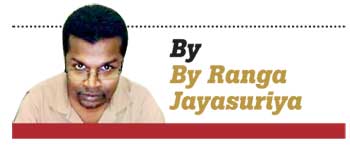 only
after the mega bond scam that took place right under its nose was
highlighted by the Auditor General. The government’s tactics are a ruse
to distort and distract the public opinion on the bond scam, which is by
far the mother of all scams that ever happened in this country. Thus,
the problem is not just corruption, but impudence with which corruption
is whitewashed.
only
after the mega bond scam that took place right under its nose was
highlighted by the Auditor General. The government’s tactics are a ruse
to distort and distract the public opinion on the bond scam, which is by
far the mother of all scams that ever happened in this country. Thus,
the problem is not just corruption, but impudence with which corruption
is whitewashed.
President Sirisena has belatedly appointed a Special Presidential Commission to investigate the bond scam. Unfortunately though, he spent too long pondering over his action -- or perhaps waiting for the opportune moment, i.e. forthcoming local government elections, to score a point. However, by then, the damage will be done. Still, better late than never.
Also, Sri Lanka seems to be lacking laws to tackle sophisticated financial crimes, which the President himself implied when he revealed that the bond deal was being investigated under the civil law, whereas it ought to be treated under the criminal law. Sophisticated and politically-connected crooks exploit those loopholes to empty the government’s coffers.
 only
after the mega bond scam that took place right under its nose was
highlighted by the Auditor General. The government’s tactics are a ruse
to distort and distract the public opinion on the bond scam, which is by
far the mother of all scams that ever happened in this country. Thus,
the problem is not just corruption, but impudence with which corruption
is whitewashed.
only
after the mega bond scam that took place right under its nose was
highlighted by the Auditor General. The government’s tactics are a ruse
to distort and distract the public opinion on the bond scam, which is by
far the mother of all scams that ever happened in this country. Thus,
the problem is not just corruption, but impudence with which corruption
is whitewashed.President Sirisena has belatedly appointed a Special Presidential Commission to investigate the bond scam. Unfortunately though, he spent too long pondering over his action -- or perhaps waiting for the opportune moment, i.e. forthcoming local government elections, to score a point. However, by then, the damage will be done. Still, better late than never.
Also, Sri Lanka seems to be lacking laws to tackle sophisticated financial crimes, which the President himself implied when he revealed that the bond deal was being investigated under the civil law, whereas it ought to be treated under the criminal law. Sophisticated and politically-connected crooks exploit those loopholes to empty the government’s coffers.
"The Rajapaksa regime was phenomenally corrupt, but compared to its predecessors, it was efficient. It did not negotiate for years to finally come up with some shoddy deal that could well be suspended again for a review"
There was a stock market mafia that thrived under the former regime;
Prime Minister Ranil Wickremesinghe even read in Parliament a list of
names of individuals who were implicated in pump and dump deals in the
Colombo Stock Market. As expected, no follow-up action was taken. Now we
have a bond market mafia. Mr. Wickremesinghe would not be reading names
for the obvious reason. However, that would not negate the existence of
the problem.
The election of President Sirisena and the unity government were once treated as a revolution. Revolutions, through the ballot or street protests, could only take a country so far. Sri Lanka at present may hold some distressing similarities with Ukraine, where several years back, mass protests toppled the pro-Russian Kleptocracy of Viktor Yanukovych, and brought to power the pro-European opposition. Now it appears that the latter is pilfering the State’s coffers more efficiently than its predecessor did, in addition to provoking a ruinous war with its powerful neighbour Russia.
Corruption, both real and perceived, would erode the appeal of recent democratic gains and endanger the future constitutional reforms that are intended to address the national question. Some time back, TNA MP Sumanthiran prophesied that if any it would be corruption that would derail a new Constitution. His prediction is menacingly coming closer to become a reality. High-level corruption would swallow up all the goodwill of this government and create a vacuum that would be filled by opportunistic charlatans who offer very simple solutions to complex problems, and govern the country by sowing divisions. That is where Mr. Rajapaksa comes in.
Follow Ranga Jayasuriya @RangaJayasuriya on Twitter
AITSU says its trade union activist is missing

 By admin-January 30, 2017
By admin-January 30, 2017
A trade union activist of the All Island Telecom Services Union (AITSU) is missing since 28 January, its President Nimantha Wijesuriya says.
He made the observation while speaking at a press conference held in Colombo on Monday.
Wijesuriya went on to say they could not locate the whereabouts of AITSU’s Deputy President who was last reportedly seen riding a motorbike to his house in Pannipitiya. “The IGP, President and the Prime Minister have also been informed about this,” he said.
Sri Lanka Telecom (SLT) Manpower workers also resorted to a protest as they had not received a proper response regarding demands to provide permanent employment on 25 January.
Wijesuriya also slammed the ‘dictatorship’ of the administration of the SLT, though the Minister has already issued a directive to address their issues.

 By admin-January 30, 2017
By admin-January 30, 2017A trade union activist of the All Island Telecom Services Union (AITSU) is missing since 28 January, its President Nimantha Wijesuriya says.
He made the observation while speaking at a press conference held in Colombo on Monday.
Wijesuriya went on to say they could not locate the whereabouts of AITSU’s Deputy President who was last reportedly seen riding a motorbike to his house in Pannipitiya. “The IGP, President and the Prime Minister have also been informed about this,” he said.
Sri Lanka Telecom (SLT) Manpower workers also resorted to a protest as they had not received a proper response regarding demands to provide permanent employment on 25 January.
Wijesuriya also slammed the ‘dictatorship’ of the administration of the SLT, though the Minister has already issued a directive to address their issues.
The crowd is large. The scenery is packed with stormtroopers. The energy
of the rally is tangible. In the street, banners defy the breeze. On
stage, speakers define the new world order. On closer inspection, it
appears to be the old order of things thinly disguised as a change for
the better.
In Nuremberg, under the National Socialist (Nazi) regime of the 1920s and ’30s, the aspiration was to usher in a Third Reich (the first two being the German states as the crucible of the Holy Roman Empire and a unified Germany under Bismarck). In Nugegoda, under pseudo-Nazis of a not-so-different dispensation, the ambition remains the same. To define national socialism as the need of the hour, to defy the powers that be, to employ demagoguery to devastating effect on a democratic republic. Nuremberg raised a clenched fist in the face of the peaceable Weimar Republic. Nugegoda cocks a snoop at the Wickremesinghe Regime.
Both Nuremberg and Nugegoda served or serve subversive purposes. One strove to create a near hysterical fervour for the National Socialist cause, fostering anti-republican feelings against an administration the Nazis saw as cowardly, slavish towards Germany’s conquerors, enslaved by a craven desire for peace within her borders. The other struggles to concoct a historical feeling for an ultra-nationalist ethos, forging anti-democratic sentiments that favour a former regime which presents the powers that be as compromised, strategically selling the family silver to foreigners, effete.
In Nuremberg, under the National Socialist (Nazi) regime of the 1920s and ’30s, the aspiration was to usher in a Third Reich (the first two being the German states as the crucible of the Holy Roman Empire and a unified Germany under Bismarck). In Nugegoda, under pseudo-Nazis of a not-so-different dispensation, the ambition remains the same. To define national socialism as the need of the hour, to defy the powers that be, to employ demagoguery to devastating effect on a democratic republic. Nuremberg raised a clenched fist in the face of the peaceable Weimar Republic. Nugegoda cocks a snoop at the Wickremesinghe Regime.
Both Nuremberg and Nugegoda served or serve subversive purposes. One strove to create a near hysterical fervour for the National Socialist cause, fostering anti-republican feelings against an administration the Nazis saw as cowardly, slavish towards Germany’s conquerors, enslaved by a craven desire for peace within her borders. The other struggles to concoct a historical feeling for an ultra-nationalist ethos, forging anti-democratic sentiments that favour a former regime which presents the powers that be as compromised, strategically selling the family silver to foreigners, effete.
Nuremberg
Nuremberg and its ultranationalist ethos led to the putsches that brought a megalomaniac to power in Nazi Germany and held Western Europe first and then the world at large in thrall from 1933-45. Nugegoda and its latent Nazism, inflammatory rhetoric, and volatile ideas convinced of self-righteousness, poises a good and gentle nation on the brink of a war of more than words spoken in the heat of an evening’s protest meeting.
Nuremberg was once about more than just goose-stepping Hitler-saluters high on Wagner, Nietzsche, and uniformed übermenschen panting for a very precise dispensation of power. It massaged Nordic symbols such as the SS runes and manipulated geometric emblems such as the Aryan Swastika to fuel the Teutonic imagination of a world that was, and could be once again, Germany’s. The devil had the best tunes, best lines, best uniforms. The devil’s bible had ugly and evil things to say about those upon whom the Norse Gods of Asgard and Valhalla had not bestowed their favour. The devil’s henchmen’s theologies led along a hard, cruel, violent path to Auschwitz, a Berlin bunker, an apocalypse for six million Jews, holocaustic ends for countless other social and sexual undesirables: gays, gypsies, the old, the sick, the weak…

Nugegoda
Nugegoda is similarly about more than just glib-tongued Hambantota-supporters high on Wimal, Namal, and sundry supermen wearing their panties on the outside for show to impress a gullible crowd. Time and again, the mass rallies at a major junction have mismanaged public time and money and massacred traffic to spew their venom and vitriol in a public space granted them by the Government’s grace.
True, these devils too seem to have the better beats, the better speeches, the better intentions. True to Nazi form, their scriptures have hard things to hurl at those for whom there is no grace in their holy writ. True to their character, these devils’ henchmen’s pulpit-pounding invokes hell-fire on an “effeminate government” and isolation in outer darkness for others who would betray their “effervescent gallantry”. Weeping and wailing and gnashing of teeth await any and all who opt for the route governance has taken and support the alternative to autocracy that our erstwhile crazies once offered.
Nostalgia
Which, admittedly, we took them up on for a while. War ‘victories’ and triumphalistic propaganda which sprout the gospel of growth, development, and prosperity – with a will to power – are always popular. Until the attempts of the victors to become tinkerers with the people’s constitutional rights to life and liberty jeopardised their autocratisation project. However, the preachers at these rallies appear to be in denial about the rejection of the people who don’t attend their “Nugegoda as Nuremberg” protests. History’s memory is short. Hungry people – hungry for power, perks, positions, privileges, posterity’s smile – have a penchant to get nostalgic and grow maudlin about the way things used to be under Mahinda & Co. in the post-2009 years.
These historical amnesiacs would have us believe that the return of the king is a consummation devoutly to be wished. They highlight the painful shortcomings of the present coalition – bless their cotton socks – in ways that are hurtful to more than their targets, but the target audiences themselves who stand to gain more than pain from a Rajapaksa return to power in any form.
The pity of the matter is that the pulse of the people portends a rise in rhetorical temperatures at future such rallies, and the vim vigour and vitality of some short-sighted protestors can serve as rabble-rousers to a sleeping national conscience. An irony in all of this is that at a time when Government needs well-intentioned critical engagement with its plans, programs, policies – or flops, flubs, failures, and fiascos – it is the bad and the ugly rather than the good or noble who are stepping up to the mic.
A holocaust is awaiting the green light at the next junction if the series of such rallies grows from suburban disruption to national movement. Which is why government, good folks with the gift of foresight, and all citizens fair and true must step forward to put their foot down with a firm hand… to say “No!” to Nugegoda as our incipient Nuremberg.
Never again
The victors have a way of writing history that makes it memorable. Helpful to remember for those who are on the right (winning) side… Hurtful to those who would seek to disrupt the status quo of a hard-won peace. The meaning that Nuremberg had for a generation of Germans was critiqued and transformed into something of significance for the people of Europe and a watching world when the post-war trials of the Nazi regime were conducted at the most appropriate venue. Judgment at Nuremberg may have been a show trial critiqued by observers incensed by the managed spectacle put on by the triumphant allies. But it sent out a clear strong right signal that justice, though slow, would be done by the war-dead and the war-wounded and the war-abused.
Government in Sri Lanka needs to bring judgment to Nugegoda post haste in similar vein. One suspects that the affronted hotheads in the UNP for certain and perhaps among the naïve in the rest of coalition desire that justice of some sort be done. That arrests be made, criminal cases against the corrupt be expedited, big-name offenders from the previous regime be brought to book and made an example of, to deter such rallies from gaining normalisation momentum as acceptable dissent. Hope in such an otherwise natural course of action may be slim. Although it is hamstrung by its present dalliance with a party that is politically, characteristically, and temperamentally worlds and worldviews apart from it, the UNP will probably act – or not – out of a sense of self-preservation. So chances are Nugegoda will continue to be – and be allowed to be (to the chagrin of motorists and consternation of residents) – the locus of such politically volatile circuses; for the inflammatory rhetoric of Wimal, Welgama, & Co., will provide Mahinda’s machine with the gravitas the UNP hopes will rein in Sirisena.
Corruption continues: President must reverse the trend
President Sirisena having a friendly discussion with the Ven.
Muruthhetuwe Ananda Thera during an Abhayarama Temple ceremony on
Wednesday. At this ceremony, the President and Ven. Bellanwila
Wimalaratne Thera exchanged strong views regarding corruption
allegations.
- Bellanwila prelate bluntly tells Sirisena the people feel let down because of continuing fraud and other misdeeds
- Sirisena responds strongly, assures that all bond issues will be probed and those found guilty punished
- Cabinet reshuffle likely soon; four UNP ministers may face change of portfolios
- Rajapaksa rejects plea by CMs to support SLFP at polls, says Nugegoda rally proof of where the people are
By Our Political Editor-Sunday, January 29, 2017
The many challenges for President Maithripala Sirisena, now in the early days of his third year in office, seem unprecedented if not too burdensome.
Since assuming the Sri Lanka Freedom Party (SLFP) leadership in 2015,
his highest priority has been to reunify the party. That turned out to
be a futile exercise. Thus, he urged SLFP Ministers who were summoned on
January 3 to be told of his plans for 2017 to publicly “expose” the
“misdeeds” of former President Mahinda Rajapaksa and members of his
family. He began to offer plum jobs to incompetent Rajapaksa loyalists
saying they should be separated from the former President before
“dealing a hard blow at him.” He offered diplomatic postings to those
who were close to Rajapaksa. The reality that every such appointment
angered hundreds of his own supporters, and his countrymen, to say the
least, was lost on him.
Corruption continues.docx by Thavam Ratna on Scribd
SEXUAL HARASSMENT; NO EXCUSE IS GOOD EXCUSE -
2017-01-30
Aresearch conducted by Britain’s Trade Union Congress (TUC) reveals that more than half the women say they have been sexually harassed at work and most admit to not reporting it.
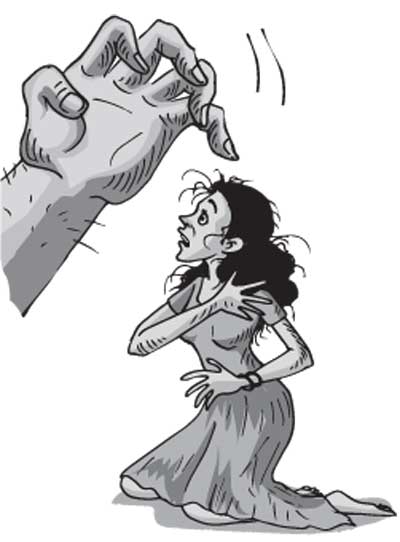 A survey of 1,500 women saw 52% cite the problem and also found a third
had been subjected to unwelcome jokes and a quarter experienced
unwanted touching.
A survey of 1,500 women saw 52% cite the problem and also found a third
had been subjected to unwelcome jokes and a quarter experienced
unwanted touching.
TUC head, Frances O’ Grady said it left women feeling ashamed and frightened.
Sexual harassment is one of the most common forms of violence against women. Sexual harassment is defined as receiving any unwanted conduct of a sexual nature including sexual comments, fondling, lewd gestures, jokes, emails, SMSs, pornographic pictures, coercion and more.
The Bangalore Mirror, on January 1, 2017, reported that its photojournalists witnessed “A brazen mass molestation of women” in the city’s central business district. The news story was picked up by other media outlets across India. Eyewitness Parikshit Murria told CNN that he saw “a horde of men” molesting girls “in every possible manner.”
While a State minister confirmed that females were “harassed”, the allegations were denied by a Police Chief in Bangalore, who suggested that they were concocted by journalists. Karnakata State Home Minister G. Parameshwara confirmed that the assaults took place, despite what the Police told CNN. However, in an interview with local press he (Minister) placed the blame on the victims, saying “they try to copy the Westerners, not only in their mindset but even in the way they dress...”. “So, some disturbance, some girls are harassed, these kinds of things do happen.”
Come on, let’s get real, in India, cows are held sacred… a non-Hindu man was, less than a year ago, beaten to death by mob because they suspected he had consumed cow meat. What hypocrisy! A man is killed for consuming the flesh of a cow, but women can be groped and harassed because of the clothes they wear?
But what is most surprising is that some women tend to accept these charges made by male chauvinists. At a recent meeting of journalists, a majority of those in attendance seemed to agree that women and the clothes they wear, were responsible for the unwanted attention from men. In our part of the world we see men (farmers) clothed in an ‘amude’ or loin cloth with nary any unwelcome attention drawn toward their almost naked bodies. But a woman in Western attire is deemed a temptress and fair target for lecherous men be they young or old.
We, the Asians refer to our countries as our ‘motherland’ - our way of showing how highly we value women. But the sad reality is that we objectify women. Despite living in an era where women as our equals, the reality is many see women as objects. We do not accept the fact that a woman’s body is her own and not a luscious chunk of flesh for men to cast their lustful eyes on. What is even sadder is when women themselves, do not recognize the fact that they are intelligent beings having the same rights as men to dress in a manner they wish without attracting unwanted attention of the opposite sex, who see their dress as an open license for sexual harassment.
A recent survey carried out in our own country reveals 15% of men surveyed in Sri Lanka admitted to having committed rape, 65% of them said they had committed rape more than once, with 40% committing the first rape before the age of 20, and horror of horrors their motivation, in the vast majority of cases was sexual entitlement. Most alarmingly, only 3.2% of those who admitted rape had been arrested and only 2.2% had been jailed. In other words, in 96.5% of rape cases, the rapists had experienced no legal consequences.
A UN survey on violence against women in Sri Lanka revealed 97% of rapists faced no legal consequences. While parliamentarian Rosy Senanayake revealed in Parliament that only 600 perpetrators of sexual abuse out of 300,000 cases (or 2%) had been remanded. Media persons - the supposed watchdogs of the nation - have been equally complicit in crimes of harassing female colleagues. According to a survey carried out by the International Federation of Journalists (IFJ), almost 29% of Sri Lankan female journalists have experienced sexual harassment in their work places.
We, Sri Lankans, have a rich 2,500-year-old history and culture. But having an age old culture is as useless as a 3-cent coin if we cannot honour our women; treat them as our equals, recognize them as persons and stop treating them as objects and playthings.
2017-01-30
Aresearch conducted by Britain’s Trade Union Congress (TUC) reveals that more than half the women say they have been sexually harassed at work and most admit to not reporting it.
 A survey of 1,500 women saw 52% cite the problem and also found a third
had been subjected to unwelcome jokes and a quarter experienced
unwanted touching.
A survey of 1,500 women saw 52% cite the problem and also found a third
had been subjected to unwelcome jokes and a quarter experienced
unwanted touching. TUC head, Frances O’ Grady said it left women feeling ashamed and frightened.
Sexual harassment is one of the most common forms of violence against women. Sexual harassment is defined as receiving any unwanted conduct of a sexual nature including sexual comments, fondling, lewd gestures, jokes, emails, SMSs, pornographic pictures, coercion and more.
The Bangalore Mirror, on January 1, 2017, reported that its photojournalists witnessed “A brazen mass molestation of women” in the city’s central business district. The news story was picked up by other media outlets across India. Eyewitness Parikshit Murria told CNN that he saw “a horde of men” molesting girls “in every possible manner.”
While a State minister confirmed that females were “harassed”, the allegations were denied by a Police Chief in Bangalore, who suggested that they were concocted by journalists. Karnakata State Home Minister G. Parameshwara confirmed that the assaults took place, despite what the Police told CNN. However, in an interview with local press he (Minister) placed the blame on the victims, saying “they try to copy the Westerners, not only in their mindset but even in the way they dress...”. “So, some disturbance, some girls are harassed, these kinds of things do happen.”
Come on, let’s get real, in India, cows are held sacred… a non-Hindu man was, less than a year ago, beaten to death by mob because they suspected he had consumed cow meat. What hypocrisy! A man is killed for consuming the flesh of a cow, but women can be groped and harassed because of the clothes they wear?
But what is most surprising is that some women tend to accept these charges made by male chauvinists. At a recent meeting of journalists, a majority of those in attendance seemed to agree that women and the clothes they wear, were responsible for the unwanted attention from men. In our part of the world we see men (farmers) clothed in an ‘amude’ or loin cloth with nary any unwelcome attention drawn toward their almost naked bodies. But a woman in Western attire is deemed a temptress and fair target for lecherous men be they young or old.
We, the Asians refer to our countries as our ‘motherland’ - our way of showing how highly we value women. But the sad reality is that we objectify women. Despite living in an era where women as our equals, the reality is many see women as objects. We do not accept the fact that a woman’s body is her own and not a luscious chunk of flesh for men to cast their lustful eyes on. What is even sadder is when women themselves, do not recognize the fact that they are intelligent beings having the same rights as men to dress in a manner they wish without attracting unwanted attention of the opposite sex, who see their dress as an open license for sexual harassment.
A recent survey carried out in our own country reveals 15% of men surveyed in Sri Lanka admitted to having committed rape, 65% of them said they had committed rape more than once, with 40% committing the first rape before the age of 20, and horror of horrors their motivation, in the vast majority of cases was sexual entitlement. Most alarmingly, only 3.2% of those who admitted rape had been arrested and only 2.2% had been jailed. In other words, in 96.5% of rape cases, the rapists had experienced no legal consequences.
A UN survey on violence against women in Sri Lanka revealed 97% of rapists faced no legal consequences. While parliamentarian Rosy Senanayake revealed in Parliament that only 600 perpetrators of sexual abuse out of 300,000 cases (or 2%) had been remanded. Media persons - the supposed watchdogs of the nation - have been equally complicit in crimes of harassing female colleagues. According to a survey carried out by the International Federation of Journalists (IFJ), almost 29% of Sri Lankan female journalists have experienced sexual harassment in their work places.
We, Sri Lankans, have a rich 2,500-year-old history and culture. But having an age old culture is as useless as a 3-cent coin if we cannot honour our women; treat them as our equals, recognize them as persons and stop treating them as objects and playthings.
Subscribe to:
Posts (Atom)









